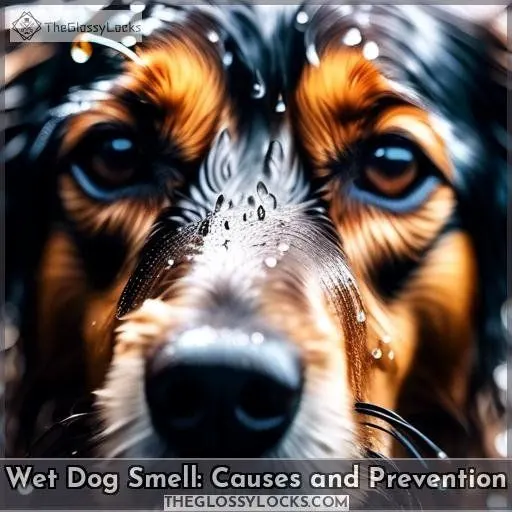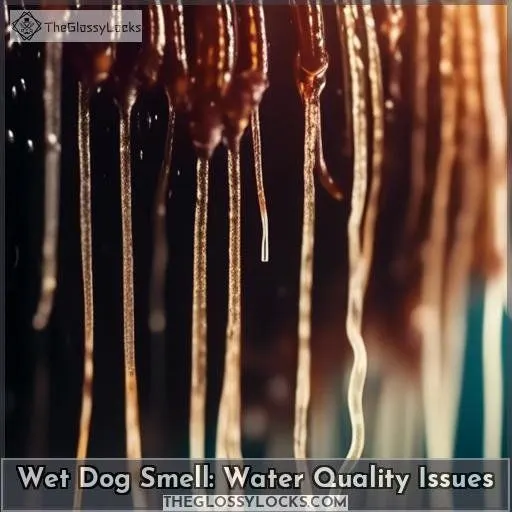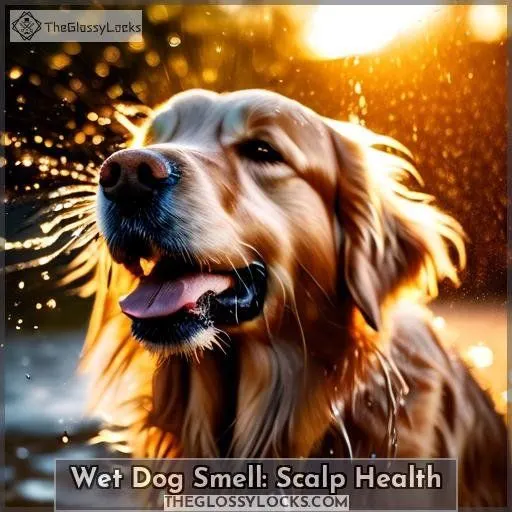This site is supported by our readers. We may earn a commission, at no cost to you, if you purchase through links.

Your hair may have that wet dog smell due to a combination of factors. Bacteria and microbes thrive in damp environments, and sweat, oil, and dirt trapped in your hair provide the perfect breeding ground. Hormonal imbalances can also disrupt your scalp’s pH, encouraging bacterial growth.
If you don’t fully dry your hair after washing, excess moisture allows microbes to multiply. To prevent this, avoid over-brushing, use gentle scalp-cleansing products, and air-dry your hair. By maintaining a healthy scalp and clean, dry hair, you can keep that unpleasant wet dog smell at bay.
Table Of Contents
Key Takeaways
- Bacteria and microbes thrive in damp environments and can cause a wet dog smell in hair.
- Hormonal imbalances can disrupt the scalp’s pH, encouraging bacterial growth and contributing to the smell.
- Proper drying of hair after washing is crucial to prevent the growth of odor-causing microbes.
- Maintaining a healthy scalp and clean, dry hair can help keep the unpleasant wet dog smell at bay.
Why Does My Hair Smell Like Wet Dog?
The smell of wet dog on your hair could be due to several reasons. One possible cause is an overgrowth of yeast or bacteria on your skin, which can lead to an excessive odor when your hair gets wet. Another factor is the moisture evaporation that carries volatile organic compounds from microorganisms living on your skin.
Additionally, a poor diet can cause yeast infections in pups, which can make their hair smell. To prevent this odor, make sure you have a regular grooming routine, including bathing and drying your hair thoroughly after getting wet.
Wet Dog Smell: Causes and Prevention
You might be wondering why your hair sometimes has an unpleasant wet dog smell after washing. This odor can stem from various factors like bacterial overgrowth, water quality issues, or scalp health problems that trap dirt and oils.
Causes of Wet Dog Smell
The wet dog smell is a common concern for pet owners, and it can be caused by several factors. Here are four key causes to explore:
- Bacteria and microbes: When your dog gets wet, bacteria and other microbes on their skin and fur can multiply rapidly, producing odorous compounds that contribute to the wet dog smell.
- Sweat: Dogs have sweat glands, but they’re primarily located in their footpads and are less effective at cooling their bodies than human sweat glands. When dogs get wet, their sweat glands can release more moisture, which can create a damp environment that encourages the growth of odor-causing microbes.
- Oil and dirt: Dogs’ fur can trap dirt, pollutants, and other substances that can contribute to the wet dog smell. This is especially true if your dog’s coat isn’t regularly groomed or washed.
- Hormonal imbalance: In some cases, excessive body odor in dogs can be caused by hormonal imbalances, which can affect the skin’s pH and create an environment that encourages the growth of odor-causing bacteria.
To prevent wet dog smell, consider the following tips:
- Dry your dog thoroughly: After your dog gets wet, make sure to dry them off as much as possible. This can help prevent the growth of odor-causing microbes and reduce the release of odorous compounds.
- Use a shampoo designed for dogs: Dog-specific shampoos are formulated to help control odor and maintain your dog’s skin and coat health.
- Regular grooming: Keeping your dog’s coat clean and free of dirt and debris can help reduce the wet dog smell.
- Consult your vet: If your dog has persistent or foul odors, it may be a sign of an underlying health problem. Your vet can diagnose and treat any medical issues that may be causing or worsening your dog’s odors.
Prevention of Wet Dog Smell
To prevent your hair from smelling like a wet dog, it’s essential to dry your hair appropriately after washing. Improper drying can lead to the growth of bacteria and fungus, which contribute to the unpleasant odor. Here are some tips to help you prevent wet dog smell:
- Avoid excessive brushing: Brushing your hair too much can cause oil buildup and create a breeding ground for bacteria and fungus.
- Clean your scalp: Regularly treat your scalp with tea tree oil, lavender oil, rosemary oil, aloe vera, or apple cider vinegar to maintain a healthy scalp and prevent fungal infections.
- Air dry your hair: Instead of using heating devices, let your hair air dry to avoid trapping moisture and creating a breeding ground for odor-causing microbes.
- Avoid using alcohol-based products: Alcohol can dry out your scalp and hair, making it more susceptible to bacteria and fungus growth.
- Wash your hair more often: Regularly washing your hair can help remove excess oil and dirt that can lead to smelly scalp and hair.
Solutions for Wet Dog Smell
Battling that dreaded wet dog smell in your hair?
It’s time to dive deep.
Start with a water analysis to sniff out the culprit.
If your findings reveal a plumbing saga, remember, your landlord should tackle those repairs promptly.
Not up to standards?
Exercise your tenant rights for quality H2O.
Sometimes, the solution is as simple as demanding action for cleaner, fresher locks.
Wet Dog Smell: Bacteria and Microbes
Bacteria and microbes play a significant role in the development of the wet dog smell. These microorganisms, including bacteria and fungi like yeast, live on your dog’s skin and fur and feed off sweat and other substances.
When your dog gets wet, the water molecules displace odor-causing compounds from the dog’s skin and hair, distributing them into the air. Additionally, the water creates a damp environment that allows the microbes to grow and multiply faster, releasing more odor-causing compounds as the water evaporates.
Wet Dog Smell: Water Quality Issues
Water quality concerns can greatly affect the scent and overall health of your hair. Here are some important points to keep in mind:
- Water filtration: Make sure your water is adequately filtered to eliminate contaminants such as rust, iron, and disinfectant byproducts that can cause an unpleasant odor.
- Pipe cleaning: Regularly clean your pipes to prevent the accumulation of bacteria and minerals that can impact your hair’s smell.
- Landlord neglect: If your water quality is poor due to neglect on the part of your landlord, think about discussing the issue with them and exploring possible solutions.
- Tenant recourse: As a tenant, you may have options for seeking reimbursement or improvements to your water quality.
Wet Dog Smell: Scalp Health
Your scalp’s condition greatly influences how your hair smells, particularly when wet. Several factors can lead to an unpleasant scalp odor, such as dandruff, hormonal imbalances, and excessive oil production. Dandruff, in particular, can cause a smelly scalp because bacteria and yeast grow excessively on the skin. Hormonal imbalances can also affect sebum production, potentially resulting in a greasy scalp and a higher likelihood of smelly hair.
To maintain a healthy scalp, it’s important to take good care of it. Washing your hair more frequently can help remove excess oil and dirt that can harbor bacteria and pollutants that contribute to odor. Using shampoos that are free of sulfates and parabens can also promote scalp health by avoiding harsh chemicals that can irritate the skin. Additionally, air drying your hair rather than using heat styling tools can prevent damage and preserve the natural oils that keep your scalp healthy.
Ingredients like tea tree oil, lavender oil, rosemary oil, aloe vera, and apple cider vinegar can also contribute to a healthy scalp. These ingredients have antimicrobial and anti-inflammatory properties that can help alleviate scalp irritation and reduce the likelihood of smelly hair. Adding a few drops of tea tree oil to your shampoo or rinsing your hair with apple cider vinegar can help maintain a healthy scalp and reduce the risk of smelly hair. Applying aloe vera gel to your scalp can also help soothe irritation and reduce dandruff, which can contribute to a smelly scalp.
If your smelly scalp persists for more than 4-5 days, is accompanied by other symptoms such as itching or flaking, or becomes severe or worsens, it may be necessary to consult a dermatologist. They can help identify any underlying conditions that may be contributing to your smelly scalp and recommend appropriate treatments.
Wet Dog Smell: Hair Care Tips
To keep your hair smelling fresh and avoid the wet dog smell, consider these hair care tips:
- Choose the right hair products: Opt for sulfate-free and paraben-free shampoos and conditioners. These are gentler on your hair and scalp, reducing the risk of irritation and odor.
- Avoid heating devices: Using hot styling tools can damage your hair and scalp, potentially leading to odor. Air-dry your hair whenever possible.
- Wash your hair more often: If your hair tends to be oily or your scalp sweats excessively, washing your hair more frequently can help prevent odor.
- Avoid caps and scarves: These can trap sweat and dirt, contributing to a smelly scalp.
Frequently Asked Questions (FAQs)
Can diet influence hair odor?
Your diet plays a surprising role – poor digestion can emit unpleasant odors, even through your hair. However, nourishing whole foods promote a healthy scalp and fresh-smelling locks. Tweak your eating, and watch your hair transform.
Does stress affect scalp smell?
Absolutely, stress can make your scalp produce more oil, triggering bacterial growth and that funky wet dog smell. Try relaxing with some deep breaths – your nose will thank you!
Are certain hair types more prone to odors?
Absolutely, certain hair types can be more prone to odors. Coarse, curly, or textured locks often trap more oils and debris, making them susceptible to funky smells. Staying on top of regular cleansing is key for fresh-smelling tresses.
How does seasonal weather impact hair smell?
Your hair’s scent can shift with the seasons. In humid summer months, excess sweat and oil buildup trap dirt, creating a wet dog aroma. But don’t fret – a good rinse and air-drying can freshen up your locks.
Can medications contribute to scalp odor?
Absolutely, certain medications can contribute to an unpleasant scalp odor. From hormonal imbalances to skin conditions, these treatments may disrupt your natural scent. But don’t worry – your dermatologist can help get to the root of the issue.
Conclusion
Banish that dreaded wet dog smell from your tresses once and for all! By maintaining a healthy scalp and using gentle products, you can bid farewell to the unpleasant why does my hair smell like wet dog conundrum.
Properly drying your hair is also key. With a few simple tweaks to your hair care routine, you’ll be sporting luscious, fragrant locks that’ll have everyone wondering how you achieved such salon-worthy results.
Don’t let a stinky situation ruin your good hair day – take control and keep that wet dog smell at bay.







